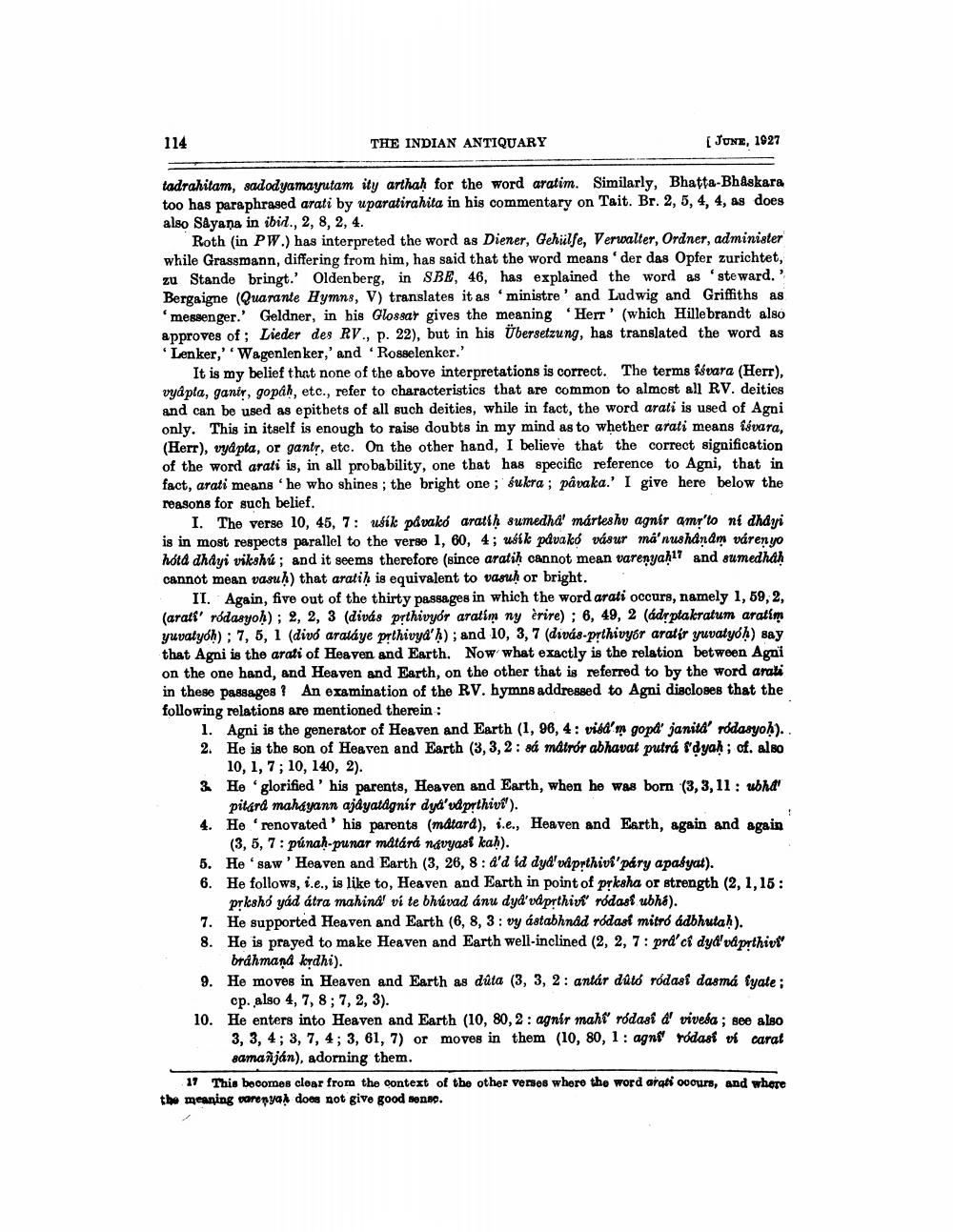________________
114
THE INDIAN ANTIQUARY
[ JUNE, 1927
tadrahitam, sadodyamayutam ity arthaḥ for the word aratim. Similarly, Bhatta-Bhaskara too has paraphrased arati by uparatirahita in his commentary on Tait. Br. 2, 5, 4, 4, as does also Sayana in ibid., 2, 8, 2, 4.
Roth (in PW.) has interpreted the word as Diener, Gehülfe, Verwalter, Ordner, administer while Grassmann, differing from him, has said that the word means 'der das Opfer zurichtet, zu Stande bringt.' Oldenberg, in SBE, 46, has explained the word as 'steward. ' Bergaigne (Quarante Hymns, V) translates it as ministre and Ludwig and Griffiths as 'messenger.' Geldner, in his Glossar gives the meaning 'Herr' (which Hillebrandt also approves of; Lieder des RV., p. 22), but in his Übersetzung, has translated the word as 'Lenker,'' Wagenlenker,' and Rosselenker.'
It is my belief that none of the above interpretations is correct. The terms isvara (Herr), vyâpta, ganir, gopah, etc., refer to characteristics that are common to almost all RV. deities and can be used as epithets of all such deities, while in fact, the word arati is used of Agni only. This in itself is enough to raise doubts in my mind as to whether arati means tévara, (Herr), vyâpta, or gantṛ, etc. On the other hand, I believe that the correct signification of the word arati is, in all probability, one that has specific reference to Agni, that in fact, arati means 'he who shines; the bright one; sukra; pâvaka.' I give here below the reasons for such belief.
I. The verse 10, 45, 7: ušík påvakó aratiḥ sumedha' márteshv agnir amṛ'to ní dhayi is in most respects parallel to the verse 1, 60, 4; usik påvakó vásur ma'nushânâm váren yo hóta dhayi vikshú; and it seems therefore (since aratiḥ cannot mean varenyaḥ17 and sumedhaḥ cannot mean vasuḥ) that aratiḥ is equivalent to vasuḥ or bright.
II. Again, five out of the thirty passages in which the word arati occurs, namely 1, 59, 2, (arati' ródasyoḥ); 2, 2, 3 (divás prthivyór aratim ny èrire); 6, 49, 2 (ádṛptakratum aratim yuvatyóḥ); 7, 5, 1 (divó aralaye pṛthivyd'ḥ); and 10, 3, 7 (divás-pṛthivyor aratir yuvatyóḥ) say that Agni is the arati of Heaven and Earth. Now what exactly is the relation between Agni on the one hand, and Heaven and Earth, on the other that is referred to by the word arati in these passages? An examination of the RV. hymns addressed to Agni discloses that the following relations are mentioned therein :
1. Agni is the generator of Heaven and Earth (1, 96, 4: visam gopa' janita' ródasyoḥ).. 2. He is the son of Heaven and Earth (3, 3, 2: sá mátrór abhavat putrá fḍyaḥ; cf. also 10, 1, 7; 10, 140, 2).
3. He 'glorified' his parents, Heaven and Earth, when he was born (3,3, 11: ubha' pitará mahayann ajâyatagnir dyá'våpṛthivi").
4. He 'renovated' his parents (matard), i.e., Heaven and Earth, again and again (3, 5, 7: púnaḥ-punar mátárá navyast kaḥ).
5. He saw' Heaven and Earth (3, 26, 8: d'd id dyd'vâpṛthivî' páry apaśyat).
6. He follows, i.e., is like to, Heaven and Earth in point of prksha or strength (2, 1, 15: pṛkshó yád átra mahina' vi te bhúvad ánu dyd'våpṛthivi ródast ubhé).
7. He supported Heaven and Earth (6, 8, 3: vy ástabhnâd ródasi mitró ádbhutaḥ).
8. He is prayed to make Heaven and Earth well-inclined (2, 2, 7: práci dyd' vápṛthivi" brahmana kṛdhi).
9. He moves in Heaven and Earth as dûta (3, 3, 2: antár dûtó ródasi dasmá iyate; cp. also 4, 7, 8; 7, 2, 3).
10. He enters into Heaven and Earth (10, 80, 2: agnir mahi ródasî d' vivesa; see also 3, 3, 4; 3, 7, 4; 3, 61, 7) or moves in them (10, 80, 1: agni ródast vi carat samañján), adorning them.
17 This becomes clear from the context of the other verses where the word arati occurs, and where the meaning varenyah does not give good sense.




